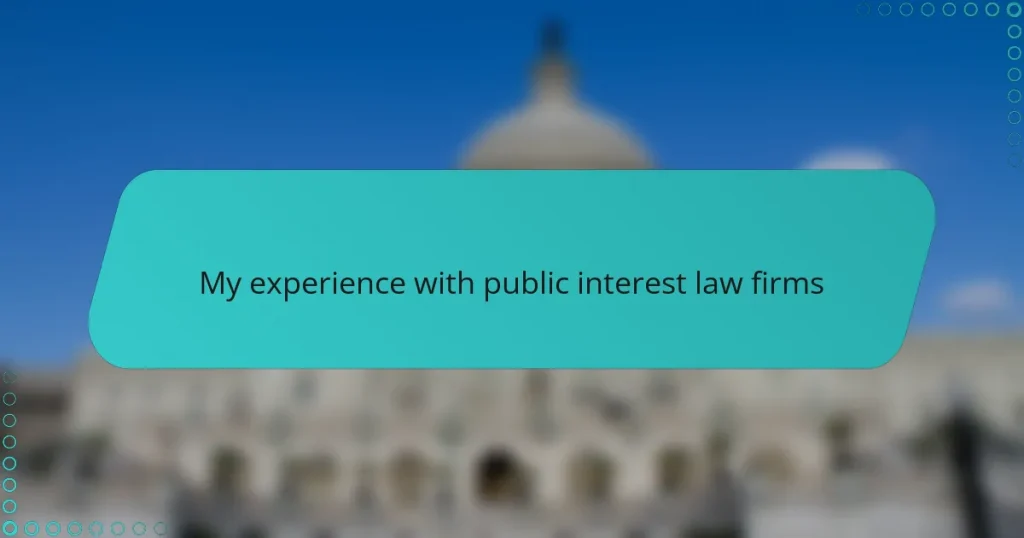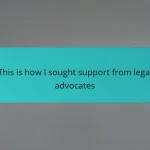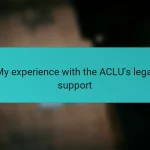Key takeaways
- Public interest law firms focus on social justice, tackling issues like civil rights and environmental protection with a commitment to empathy and change, often driven by passion rather than profit.
- Legal advocacy requires resilience, effective communication, and strategic thinking to navigate the challenges of limited resources and slow systemic progress while aiming for long-term social change.
- Firms’ cultures significantly impact employee morale; a supportive environment fosters collaboration and innovation, which are essential for successful advocacy work.
- Patience, teamwork, and self-care are crucial in advocacy, as meaningful change takes time and shared efforts while maintaining personal well-being enhances overall effectiveness.
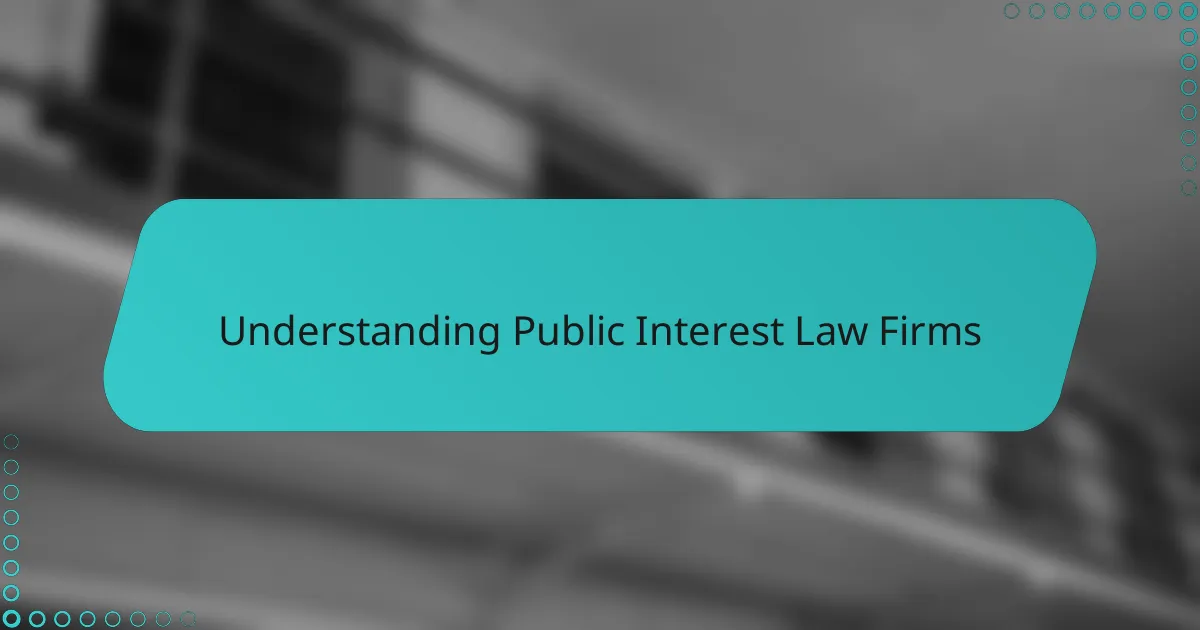
Understanding Public Interest Law Firms
Public interest law firms often operate in spaces where justice feels out of reach for many. From my time working with such a firm, I saw firsthand how these organizations dedicate themselves to causes that matter—like fighting for civil rights or environmental protection—without chasing profits. Have you ever wondered what it’s like to work where every case feels like a mission rather than just another file?
One thing I quickly realized is that these firms attract people driven by passion and purpose. It’s not just about legal expertise; it’s about empathy and a deep commitment to creating change. I remember feeling inspired daily by my colleagues, who tackled complex cases with both rigor and heart.
But working in public interest law also means facing tough realities: limited resources, high emotional stakes, and sometimes, slow progress. Yet, despite these challenges, the impact of winning even a single case can be profoundly rewarding. It made me ask myself—am I ready to stand up for what’s right, even when it’s difficult?

Roles and Goals of Legal Advocacy
Legal advocacy, as I learned, revolves around championing causes that might otherwise be overlooked. It’s about using the law as a tool to balance power, ensuring that voices from marginalized communities are heard. Have you ever noticed how advocacy goes beyond just arguing in court? It’s about shaping policies, raising awareness, and sometimes simply giving someone hope.
During my time with a public interest law firm, I saw how each legal battle had a larger goal—transforming unjust systems rather than just winning a case. The role of legal advocacy, in my experience, is both a shield for the vulnerable and a hammer against injustice. It demands patience and persistence because true change doesn’t happen overnight.
What struck me most was how every small victory contributed to a bigger movement. Legal advocates don’t just seek remedies for individuals; they aim to create lasting social change. This means thinking strategically, often balancing immediate needs with long-term goals—a challenge that requires both heart and mind.
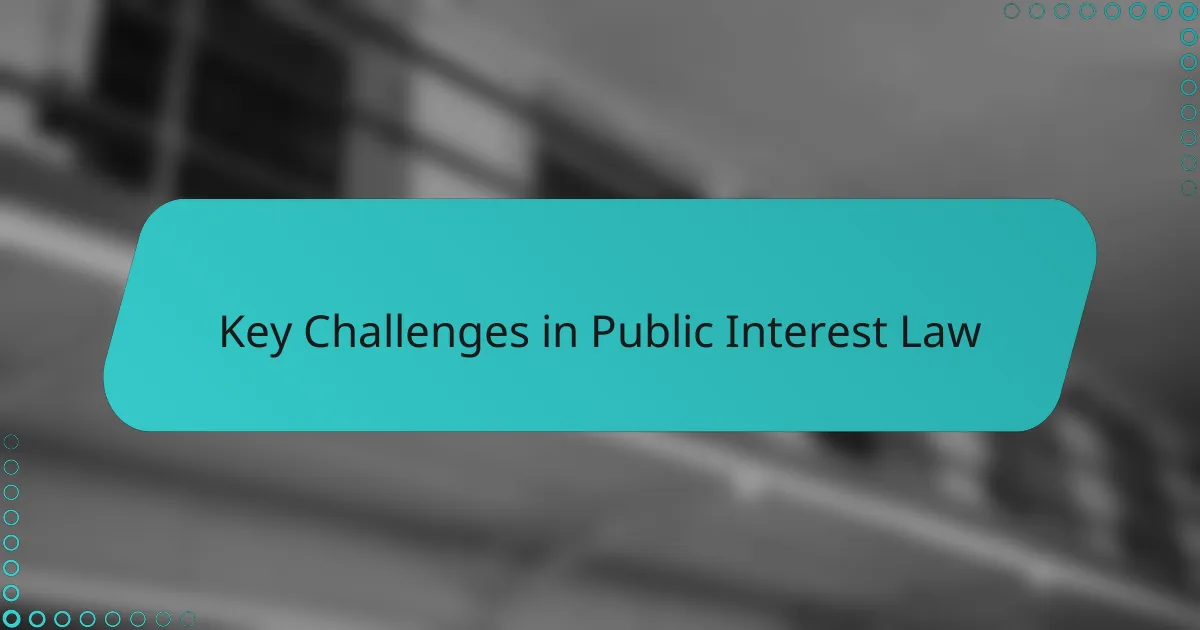
Key Challenges in Public Interest Law
One of the biggest challenges I faced in public interest law was the constant battle against limited resources. It’s hard not to feel the weight when you know there are so many cases that deserve attention, but the time, money, or staff just aren’t enough. Have you ever found yourself wanting to do more, but hitting a wall because of these constraints? That frustration stays with you, pushing you to find creative solutions while feeling the pressure of what’s left undone.
Emotional exhaustion is another hurdle that crept up on me more than once. When every client’s story is deeply personal and sometimes heartbreaking, it’s easy to absorb that pain. I remember nights lying awake, replaying tough cases in my mind and wondering if we did enough. The passion that drives you can also drain you if you’re not careful.
Then there’s the challenge of slow progress. Unlike high-profile corporate cases, public interest work often feels like pushing a boulder uphill. You celebrate small wins, but systemic change takes time—sometimes years or decades. Have you ever asked yourself if the effort is worth it when the results seem distant? From my experience, those slow victories are where true change begins, even if patience is tested every step of the way.
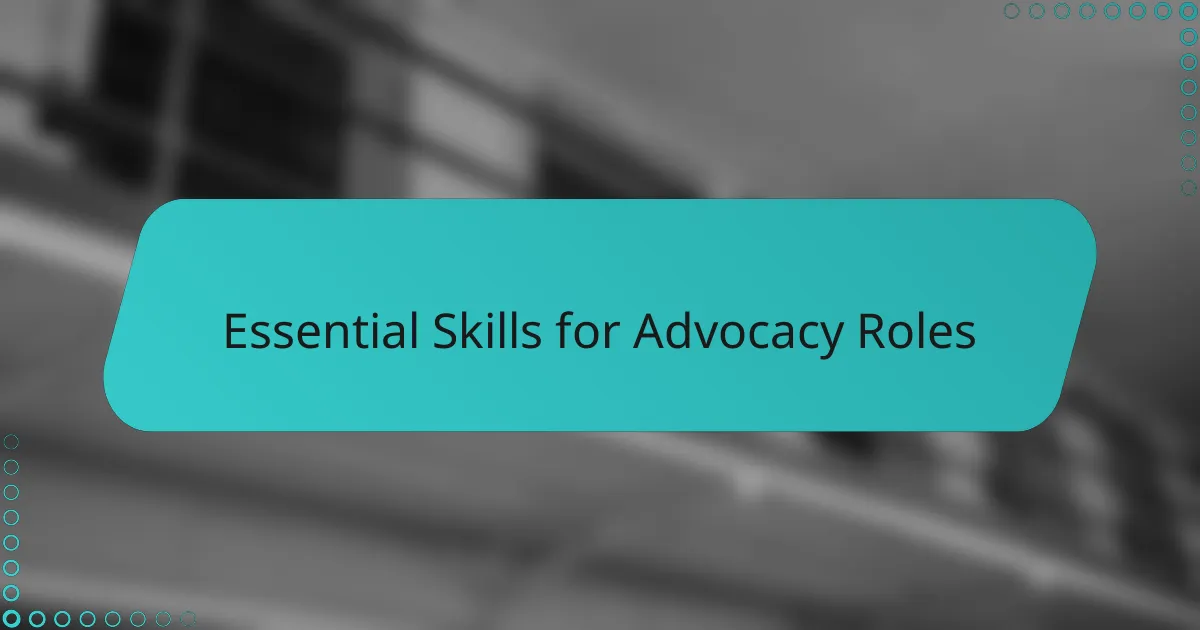
Essential Skills for Advocacy Roles
One skill that quickly stood out to me was effective communication. In advocacy roles, it’s not enough to know the law—you have to explain complex issues clearly to clients, judges, and the public. I remember one case where breaking down legal jargon into plain language made all the difference in gaining community support.
Another essential skill is resilience. Given the emotional toll and frequent setbacks, bouncing back becomes a daily necessity. I often found myself reminding, “This isn’t just about winning a case today; it’s about the long-term fight for justice,” and that mindset helped me keep going through tough days.
Strategic thinking also plays a crucial role. Advocacy isn’t just reactive; it requires anticipating challenges and planning moves carefully. From my experience, the ability to balance immediate client needs with broader systemic goals can turn a simple case into a catalyst for real change.
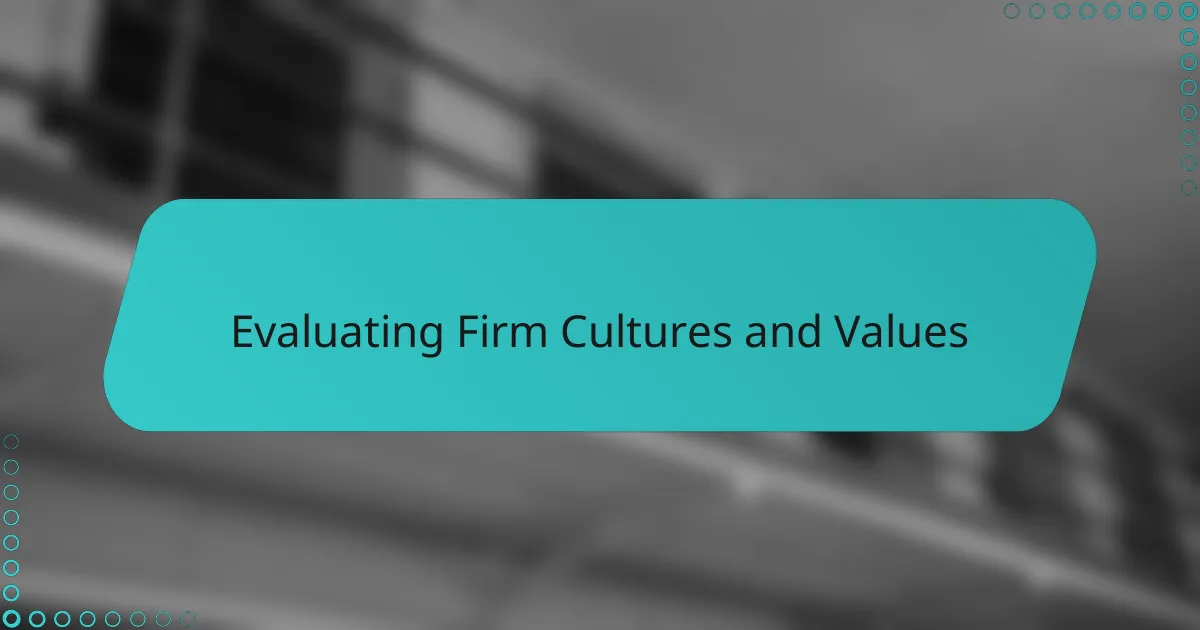
Evaluating Firm Cultures and Values
Evaluating a firm’s culture and values felt like uncovering its true heartbeat. In my experience, it wasn’t enough to admire the mission statement on the website; I needed to see how those ideals played out day-to-day. Have you ever noticed how a workplace’s atmosphere can either energize you or slowly wear you down? That contrast was clear when I compared different public interest firms.
What mattered most to me was whether the firm genuinely lived its commitment to justice and empathy—not just in the cases it took but in how it treated its people. I recall one firm where open dialogue and mutual support created a sense of family, even during high-stress moments. That kind of culture made me feel valued and fueled my passion for the work.
At times, evaluating these values meant asking hard questions: Were diversity and inclusion more than buzzwords? Did leadership encourage innovation or stick rigidly to tradition? From what I saw, firms that embraced transparency and adaptability nurtured stronger teams and more impactful advocacy. It made me realize that the right culture can transform challenges into opportunities.

Personal Experiences in Case Handling
Handling cases in a public interest law firm was unlike anything I’d experienced before. I remember one particular case that tugged at my heart—a family facing eviction due to unfair housing laws. It wasn’t just about statutes and briefs; it was about real people’s lives hanging in the balance. Have you ever felt the pressure when a client’s well-being rests heavily on your shoulders? That experience taught me the importance of not only legal strategy but also human connection.
Each case brought its own set of hurdles, often demanding quick thinking and unwavering dedication amid scarce resources. I found myself juggling multiple roles—counselor, investigator, and sometimes even fundraiser—just to keep a case moving forward. There were moments of doubt, but then a breakthrough in court would remind me why the work mattered so much. Did you ever feel that mix of exhaustion and exhilaration all at once?
What struck me most was how every case, no matter how small, contributed to a larger narrative of justice. Winning a single battle felt like a shared victory for the client and the community. I once worked on a case that seemed straightforward but ended up setting a legal precedent benefiting dozens more people. It’s in these moments that I realized case handling in public interest law isn’t just about individual outcomes—it’s a step toward systemic change.
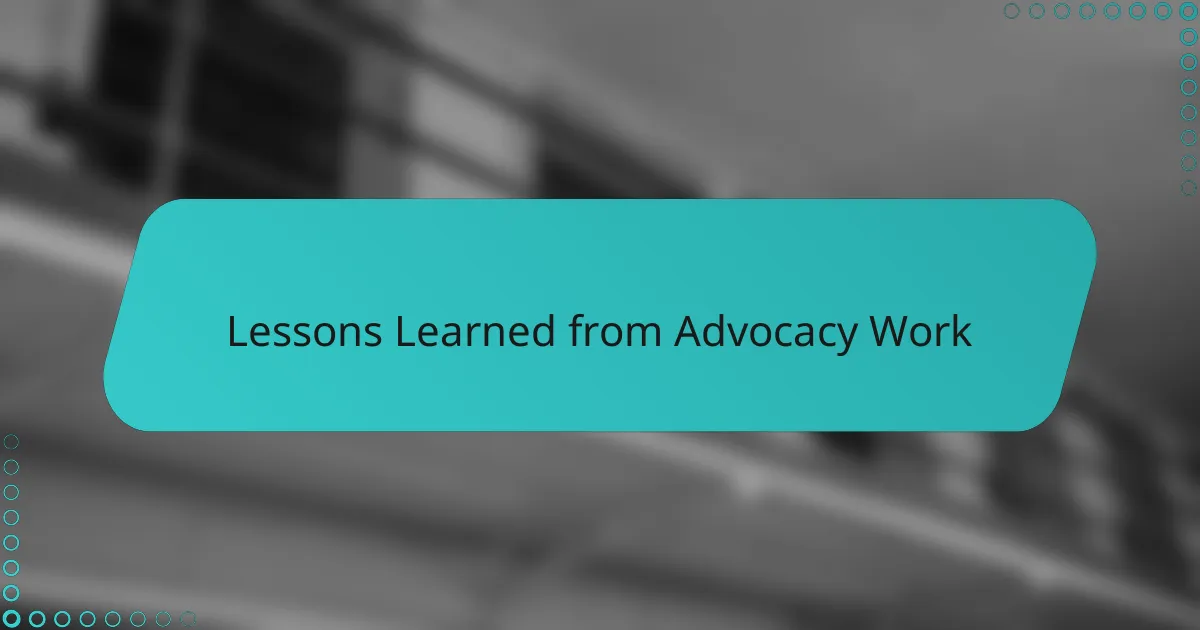
Lessons Learned from Advocacy Work
One lesson that really stayed with me is how crucial patience is in advocacy work. Change rarely happens overnight, and I came to appreciate the slow, steady grind as part of what makes victories meaningful. Have you ever found yourself wondering if the long wait is worth it? I felt that question deeply, and over time, I learned that persistence often opens doors others believe are permanently shut.
Another insight came from witnessing the power of collaboration. Advocacy isn’t a solo venture; it thrives on teamwork—between lawyers, clients, and communities. I recall moments when collective efforts sparked breakthroughs that felt impossible alone. It made me realize that sharing the emotional load and pooling diverse strengths isn’t just helpful; it’s essential.
Lastly, I learned that self-care matters more than I initially thought. Immersed in heart-wrenching cases and high stakes, it’s easy to forget your own limits. I had nights when exhaustion crept in, blurring my focus. Reflecting on those times, I see now that taking care of myself allowed me to serve clients better and sustain my commitment in the long run. Have you considered how vital balance is in your own advocacy journey?
